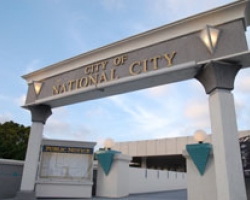Marissa Acierto, 60 is a biotechnology worker running a non-partisan campaign to represent District 3 on City Council. She has fewer than $1,500 in campaign contributions but lists District 3 incumbent Mona Rios and Mayor Alejandra Sotelo-Solis among her endorsers.

Her top three goals, if elected, are to improve public health and safety in the community, address trash associated with homelessness in an effort to boost tourism, and help grow small businesses.
“We have to make sure all the west side businesses contributing to unhealthy air quality are removed. Asthma is a pretty bad issue in that area, and health in general needs to be an important issue. I was a team leader for a healthy eating program, used to go into restaurants and food marketplaces to show participants affordable and healthy foods,” Acierto said, a step toward addressing obesity.
A former Edutech teacher, Acierto said she has many former students who used public transportation and thinks the system could be improved to benefit city residents. Ideally, she’d like to see widely publicized timetables and reliable bus connections.
She would also like to address city lighting in an effort to improve safety and would like the city to install more traffic lights near Plaza Boulevard. Small candles and flowers seen at any particular location are a sign an area is too dark and someone likely died in an accident there, she said, and indicates the spot could benefit from safety improvements.
“Also, in order for us to make sure people come into the community to live and play and pray, residents in general and tourists can’t engage in seeing our community because homelessness is getting really bad. In District 3, our community, it is rampant and the trash is getting so bad. I think we need to create a task force to remove trash, have someone survey it and have several people who would engage in that,” Acierto said.
The candidate and her campaign workers were talking with older residents, she said, who are bothered by homeless residents using their hoses for water.
“Some of them are scared seniors who are really concerned homeless people are using their water and contaminating the area. Maybe we need to have a lock like we have with a fire hydrant or a box method,” Acierto suggested.
The city could benefit from shelters like East County Transitional Living Center, a faith-based El Cajon facility she said she visited and learned they had “over $2 million in the bank at the time” with corporate sponsors helping fund their programs.
“I ran into a former teacher, a friend and noticed he was dressed nicely but was dirty with sun-darkened skin and he looked homeless. He asked if I had a blanket in my car and I didn’t but I gave him a sweatshirt I really loved, told him he needed to go somewhere and took him to the place in East County. The thing is, not everybody is going to want that because you have to put God in your life first and some people are atheists or all different religions. If you can put God in your life, you have a place to stay,” Acierto said.
She did not share any plans for how she would install a similar facility in National City, how it would be funded or what can be done for homeless residents who do not wish to enter a faith-based program.
The candidate was not aware of the Point in Time count which aims to identify how many homeless residents are on the streets in census blocks on any given night but thinks the city would benefit from a task force to develop solutions.
“It’s a catch-22: people want something for the homeless but don’t want it here,” Acierto said.
She described her eagerness to bring biotechnology satellites from North county companies to the city in an effort to create well-paying jobs for local residents which would afford them the income to purchase an affordable home.
“I want us to have biotechnology satellites with people who receive on-the-job training and mentorship programs with large companies like Ely Lilly, Genesis, even Moderna or Pfizer. If we could approach them, create a partnership for them to develop satellite Research and Development programs here in National City, we could engage residents with those jobs,” Acierto said, her voice rising with passion.
Southwestern College, she said, has an optical program where students go to school locally and are ultimately certified to work in eyeglass development; she would use that program as a model for biotechnology programs.
“This would be the same concept— we could create vibrant little hubs, mini areas to engage residents in technical training programs, even mini-vocational satellite schools within the public transportation area,” Acierto said.
She would also like to create a River Walk or similar tourism-focused area to create tax revenue for the city with small businesses and new entrepreneurs. Ideally, those young professionals would buy local homes.
“I’m not a real estate agent but I would refer people to Housing and Urban Development for information on affordable housing programs. I’ve spoken to a real estate agent and having a job doesn’t mean anything if it’s not a high enough paying job,” Acierto said.
Large banks like Bank of America and Chase Bank “should have some programs available to assist homebuyers with better loans, small business loans” and help identify affordable housing options, she said. If elected, she would push for a city-led task force to address affordable housing rather than do so from the dais.
“We need to revisit affordable housing but have to work with experts in the field, not reinvent the wheel,” Acierto said.
District 3, which was deliberately shaped as a majority-Asian American and Pacific Islander neighborhood when the city shifted to district-based elections, is just a small area of the city, Acierto said. She is running against another Filipino-American candidate, National City Planning Commissioner Ditas Yamane. However, she wants to engage everyone in the community, she said, regardless of race.
“I love being a Filipino of Hispanic descent but in order to move forward we can’t go backwards. This community is 44.4% Latinos, Hispanic, Mexican. Out of that, 33.4% are Asian American and Pacific Islander and out of that only about 12% are Filipino— the others are Laiotian, Vietnamese, Thailander, Korean, Samoan, Hawaiian… My message is really to make sure the community understands we need to engage in unification,” Acierto said.












